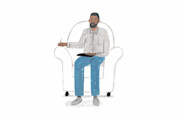Mindfulness is the state of being fully attuned to the present moment and bodily sensations—without dwelling on the past or worrying about the future.
If achieving a state of mindfulness sounds challenging to accomplish on your own at home, I have some good news to share.
There are numerous therapists and counselors nationwide trained in mindfulness-based approaches such as mindfulness-based therapy (MBT), mindfulness-based stress reduction (MBSR), and mindfulness-based cognitive Therapy MBCT who can guide us in practicing mindfulness exercises in-person or via telehealth video sessions.
Hopefully this makes it more accessible and available for everyone to develop a mindfulness routine and—importantly—to experience the research-backed benefits.
Mindfulness can help us take a breather from stress.
Through cultivating mindfulness, we develop acceptance and awareness of our own physical and mental state.
And this calm, grounded awareness helps us respond more gracefully to difficult situations—rather than acting impulsively.
This state of mindfulness can help us take a breather from stress and even provide us a fresh perspective.

Benefits of mindfulness therapy
While mindfulness has roots in Buddhist meditation traditions, today’s mindfulness-based therapy is practiced in a secular, inclusive, and evidence-based context—making it accessible to people of all backgrounds and belief systems.
As part of your at-home mental health self-care routine, you can practice mindfulness anywhere, without equipment, tools, or props.
And, unlike all the fancy candles and essential oils, mindfulness is free.
While we can practice mindful breathing and mindfulness exercises on our own, there are numerous research-backed mental health benefits of mindfulness-based therapy sessions with licensed therapists trained in MBSR and MBCT.
Unlike all the fancy candles and essential oils—mindfulness is free.
In fact, a 2013 comprehensive meta-analysis of over 200 studies concluded that mindfulness-based therapy is especially effective for reducing anxiety, depression, and stress.
And a 2018 meta-analysis found the most consistent evidence in support of mindfulness for depression, pain conditions, smoking, and addiction disorders.
What's the difference between MBSR and MBCT?
First, let's decode those pesky acronyms.
MBSR is mindfulness-based stress reduction, and MBCT is mindfulness-based cognitive therapy.
Mindfulness-based stress reduction was developed in 1979 by Dr. Jon Kabat-Zinn, Ph.D., professor of medicine at the University of Massachusetts Medical School.
UMass Memorial Health offers an eight-week MBSR program that teaches people how to increase mindfulness through meditation and yoga.
MBSR is mindfulness-based stress reduction, and MBCT is mindfulness-based cognitive therapy.
And more than 25,000 participants have completed the program since its inception.
Over the past forty years, the eight-week MBSR method has been adapted and implemented in medical centers, prisons, and veterans' centers worldwide.
In comparison, according to a 2019 American Psychological Association (APA) article on mindfulness meditation, MBCT is a therapeutic intervention that combines elements of MBSR and cognitive behavioral therapy (CBT) to treat people with depression.

What happens in a mindfulness therapy session?
A typical mindfulness therapy session might include guided breathing or body scan meditations, discussions about how mindfulness applies to your daily experiences, and identifying unhelpful thinking patterns.
Therapists often integrate techniques from cognitive behavioral therapy (CBT) and acceptance and commitment therapy (ACT) to help you build a regular practice between sessions.
How do you practice mindfulness?
Therapist and mindfulness practitioner Dr. Nikki Rubin, Psy.D, recommends these five quick-start tips for anyone interested in starting a mindfulness practice as part of their mental health self-care routine.
Set aside some time. You don’t need special equipment to access your mindfulness skills—but you need to set aside some time and space.
Observe the present moment as it is. The aim of mindfulness is not quieting the mind, or attempting to achieve a state of eternal calm. The goal is simple: aim to pay attention to the present moment, without judgment.
Let your judgments roll by. When we notice judgments come up during our practice, we can make a mental note of them and let them pass.
Return to observing the present moment as it is. Our minds often get carried away in thought. That’s why mindfulness is the practice of returning, again and again, to the present moment.
Be kind to your wandering mind. You may think to yourself: "I'm bad at therapy." Don’t judge yourself for whatever thoughts crop up, just practice recognizing when your mind has wandered off, and gently bring it back. It’s completely normal for your mind to wander during mindfulness practice—that’s part of the process. The goal isn’t to have a blank mind, but to notice when your thoughts drift and gently return to the present. Mindfulness is a skill, not a talent—and anyone can learn it.

Find a mindfulness therapist near you
The Therapy Finder Directory from SimplePractice can help you find a therapist near you who specializes MBSR (mindfulness-based stress reduction) and/or MBCT (mindfulness-based cognitive therapy).
The best way to get the most out of mindfulness is simple—practice regularly.
And, while mindfulness-based therapy can be highly effective for many people, it’s not a one-size-fits-all approach.
Some individuals—especially those with certain trauma histories—may benefit more from other therapeutic modalities. A licensed therapist can help determine what approach is best for your needs.
Reach out, and let our editorial team know how it goes for you. Send an email to editorial@simplepractice.com.
READ NEXT: What's the Difference Between a Therapist and a Coach?
Need to find a therapist near you? Check out the SimplePractice Therapy Finder Directory to find licensed mental health therapists with availability and online booking.
American Psychological Association. (2020). Stress in the time of COVID-19. Retrieved from [PDF] https://www.apa.org/news/press/releases/stress/2020/stress-in-america-covid.pdf
Casarella, J. (2019). Stress symptoms: Physical effects of stress on the body. WebMD. Retrieved from https://www.webmd.com/balance/stress-management/stress-symptoms-effects_of-stress-on-the-body#1
Mindful. (2018). Getting started with mindfulness. Retrieved from https://www.mindful.org/meditation/mindfulness-getting-started/
Roemer, L., Orsillo, S. M., & Salters-Pedneault, K. (2008). Efficacy of an acceptance-based behavior therapy for generalized anxiety disorder: Evaluation in a randomized controlled trial. Journal of Consulting and Clinical Psychology, 76(6), 1083–1089. https://doi.org/10.1037/a0012720







